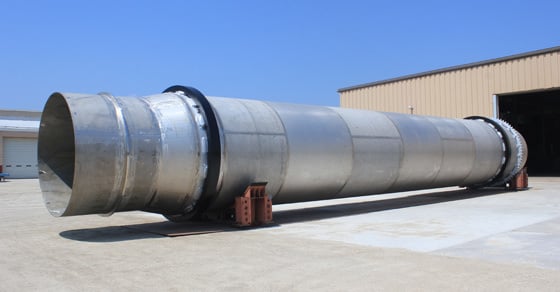The rotary kiln is a diverse thermal processing device capable of carrying out a variety of process objectives, from burning off volatile components to activating carbon, and more.
As a substantial investment, those looking to purchase a rotary kiln must make every effort to avoid purchasing pitfalls and ensure that the best possible processing solution is achieved. The questions listed here provide a starting point covering some of the most critical considerations to keep in mind when purchasing a rotary kiln.
Is a rotary kiln appropriate for my capacity requirements?
Commercial-scale rotary kilns are intended for continuous operations processing anywhere from 1-50 TPH (and in some cases even more). As such, they are typically not economically practical below this capacity.
Those looking for small or batch-scale processing capabilities may want to consider an alternative technology.
Is a kiln the best thermal treatment device for my application?
While rotary kilns can process a wide array of material types, they may not always be the best fit. Testing in a facility such as the FEECO Innovation Center to confirm process feasibility is often recommended, particularly when the process is novel.
Testing will not only help to confirm feasibility of the process, but will also bring the economic realities of the intended process into focus.
What, if any, pretreatment will be required for the feedstock?
The need for pretreatment is typically dependent upon the processing goal. In general, however, the more uniform the feedstock, the more uniform the results will be. As such, many producers will benefit from some form of pretreatment to promote uniformity in particle size distribution, moisture content, and chemical make-up, with typical treatment techniques including:
- Agglomeration (particle size englargement)
- Pre-drying/Pre-heating
- Crushin/Grinding
The need for pretreatment of the feedstock may not always be readily apparent. Here again, testing the intended process will reveal if pretreatment is necessary.
What configuration will best fit my process and material goals?
Rotary kilns are available in several different configurations, the most notable including direct or indirect, and co-current or counter-current (in reference to the airflow). Various customizations for internals, seals, and more are also possible to optimize kiln performance.
Kiln configuration and customization are highly dependent on the processing goals, and how the kiln will need to work with the unique characteristics of the feedstock to produce the desired results. For this reason, it is incredibly important to approach one-size-fits-all and standardized solutions with caution; a reputable rotary kiln manufacturer will evaluate the feedstock and determine the best configuration based on the specific material and processing goals.
What happens if something goes wrong after the sale?
Finding out that the manufacturer doesn’t support the unit or process after the sale is a costly mistake that results in a lot of headaches. While this is the case with many types of processing equipment, it is especially true of rotary kilns, where the increased temperatures and harsh processing conditions amplify the potential for something to go wrong.
Does the OEM offer a process or mechanical warranty? Do they service their equipment, or will a third-party service provider be necessary? Vet OEMs carefully to ensure that whatever support may be needed in the event of an issue, the OEM is ready to assist.
Can my site support a rotary kiln?
Consider that the site will have several requirements in order to support a rotary kiln. Is there reliable electricity? Is the site located in a region where the intended fuel source is readily and economically available? Are there any spatial constraints? What about emissions; what regulatory requirements will the site be bound by?
Will testing be required in order to design a commercial-scale unit?
Depending on the level of experience of the chosen OEM, as well as the intended process and material feedstock, kiln testing may or may not be necessary. Those working with a novel process, or with a material that exhibits significant variation will almost always require testing.
Testing at batch or pilot scale is a valuable way to de-risk the project, identifying process challenges up front and gathering critical data for scale-up.
What other equipment is required to support the kiln?
The rotary kiln is not a stand-alone processing unit; it requires the support of several other systems. While all processes vary, a rotary kiln will always require the following:
- Exhaust gas handling system for collecting and treating (conditioning) products of combustion, loss on ignition, gaseous emissions, and small particulates.
- Bulk material handling equipment for feeding and offtake
- Induced draft (ID) fan
Is the OEM available to assist with process/system integration?
OEMs vary significantly in their depth of offerings. Selecting an OEM that can provide as much of the system as possible – or ideally the whole kiln system – is preferred, as it comes with single-source responsibility. In addition to holding the manufacturer accountable, single-source responsibility reduces the buyer’s leg work in sourcing the various components and integrating them into one seamless solution.
What sort of quality control practices should we look for?
In addition to the capabilities of manufacturers varying significantly, the same can be said of their equipment quality, so it is important to vet their quality standards. Request a comprehensive quality procedure document from the manufacturer. This typically includes data on welding and engineering quality procedures, material receiving, storage, and purchasing, manufacturing non-destructive testing (NDT), and other quality-testing procedures.
What can I expect in terms of maintenance?
The level of maintenance required by a rotary kiln depends largely on the demands placed upon it – i.e., the processing conditions. In addition to routine maintenance such as lubricating gears, changing the gearbox oil, etc., FEECO recommends all kilns, at a minimum, undergo an annual inspection by the OEM in order to identify potential problems before they have a chance to escalate.
Rotary kilns also require routine kiln re-alignment, as they naturally fall out of alignment over time. Tire and trunnion grinding are also important to maintaining the mechanical stability of the kiln, though not all kilns will experience wear.
Are control systems available?
Control systems such as programmable logic controllers (PLCs) can significantly enhance data collection, recording, and trending capabilities. Having this type of info at their fingertips, operators are often better able to predict, prevent, troubleshoot, and resolve issues. These systems can be integrated with an existing plant’s distributed control system (DCS) or main control system for optimal efficiency and process transparency.
How do I choose a supplier?
Selecting the right rotary kiln manufacturer requires careful evaluation of each potential supplier, ensuring they have adequate process development capabilities, advanced thermal processing knowledge, proven kiln design, and much more. Identify the key objectives for the project at hand and assess manufacturers in accordance with this list.
Will this equipment allow us to comply with emissions and any regulatory requirements?
Ensure that the manufacturer is capable of addressing emissions requirements based on the project specifications. Here, a single-source provider is especially beneficial, as the OEM will manage the system in its entirety, including exhaust gas handling and air pollution control systems.
What are the structural base requirements for a rotary kiln?
A rotary kiln base must be designed to handle both live and dead loads without any distortion or vibration. Often, kilns are supported by concrete piers and/or structural steel supports. Specifications for base requirements are typically laid out by the OEM in the general arrangement (GA) drawings.
Conclusion
Purchasing a rotary kiln requires a thorough evaluation of vendors, with many factors to keep in mind to ensure a kiln fit for duty.
FEECO is a leading provider of engineered rotary kilns for applications of all types. In addition to our custom rotary kilns and complete kiln systems, we offer comprehensive kiln testing programs in our Innovation Center, as well as parts and service support for maintaining rotary kilns. We seamlessly guide our customers through the rotary kiln purchasing process to help them achieve their ideal processing solution. For more information, contact us today!



